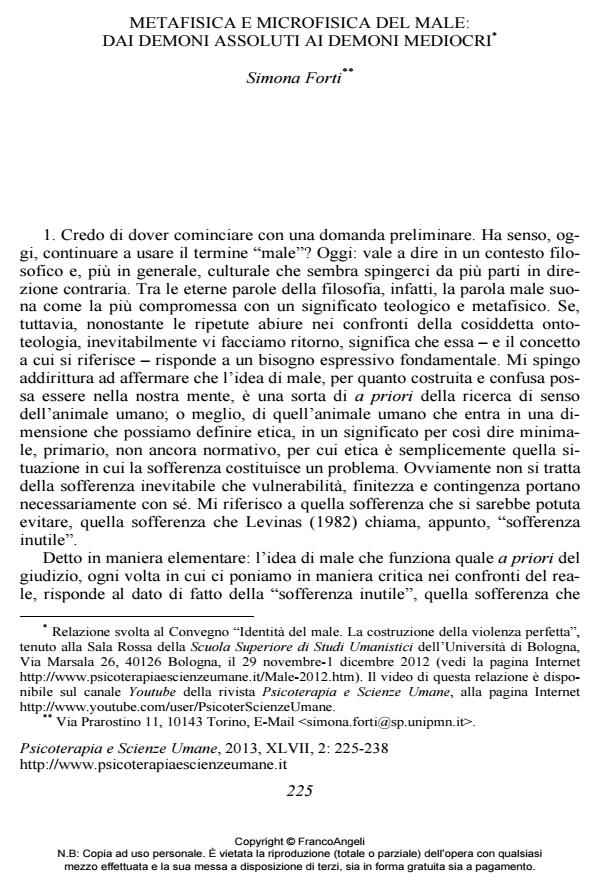Metafisica e microfisica del male: dai demoni assoluti ai demoni mediocri
Titolo Rivista PSICOTERAPIA E SCIENZE UMANE
Autori/Curatori Simona Forti
Anno di pubblicazione 2013 Fascicolo 2013/2
Lingua Italiano Numero pagine 14 P. 225-238 Dimensione file 154 KB
DOI 10.3280/PU2013-002006
Il DOI è il codice a barre della proprietà intellettuale: per saperne di più
clicca qui
Qui sotto puoi vedere in anteprima la prima pagina di questo articolo.
Se questo articolo ti interessa, lo puoi acquistare (e scaricare in formato pdf) seguendo le facili indicazioni per acquistare il download credit. Acquista Download Credits per scaricare questo Articolo in formato PDF

FrancoAngeli è membro della Publishers International Linking Association, Inc (PILA), associazione indipendente e non profit per facilitare (attraverso i servizi tecnologici implementati da CrossRef.org) l’accesso degli studiosi ai contenuti digitali nelle pubblicazioni professionali e scientifiche.
Vengono descritti due diversi modi di pensare il male politico, definiti, rispettivamente, (I) "paradigma Dostoevskij" e (II) "paradigma dei demoni mediocri". La correlazione tra volontà, onnipotenza e nulla, sebbene non più secondo il nesso religioso con cui Dostoevskij li concatenava, è infatti stata assunta e rielaborata dai maggiori filosofi della prima metà del Novecento, che hanno continuato a pensare il male come esito della perversione della volontà in onnipotenza, come risultato di un soggetto sovrano - collettivo o individuale - che per elevarsi a tutto produce il nulla. Viene argomentato che ora è tempo di elaborare un altro paradigma, il "paradigma dei demoni mediocri", secondo cui il male è un sistema nel senso di un intrigo di soggettività, di una rete perfettamente intrecciata di relazioni. Ciò significa innanzitutto porre in questione il ruolo esclusivo della volontà e del desiderio di morte, e guardare invece alle scene del male come luoghi potentemente abitati dalla volontà di vita.
Parole chiave:Male politico, paradigma Dostoevskij, paradigma dei demoni mediocri, desiderio di morte, onnipotenza, volontà di vita
Simona Forti, Metafisica e microfisica del male: dai demoni assoluti ai demoni mediocri in "PSICOTERAPIA E SCIENZE UMANE" 2/2013, pp 225-238, DOI: 10.3280/PU2013-002006